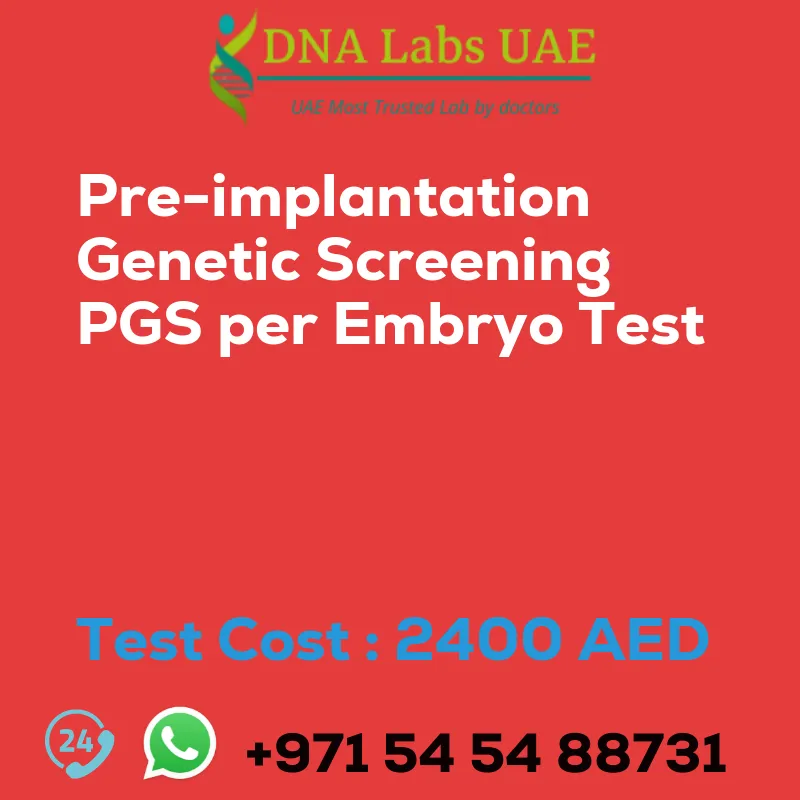Pre-implantation Genetic Screening (PGS) per embryo Test
Test Name: Pre-implantation Genetic Screening (PGS) per embryo Test
Components: Please request collection material
Price: 2400.0 AED
Sample Condition: Blastocyst/Trophectoderm
Report Delivery: 1-2 days
Method: NGS/Microarray
Test Type: Genetics
Doctor: Gynecologist
Test Department: Pre Test Information
Pre Test Information: Pre-implantation Genetic Screening (PGS) per embryo can be done with a doctor’s prescription. Prescription is not applicable for surgery and pregnancy cases or people planning to travel abroad.
Test Details
Pre-implantation Genetic Screening (PGS) is a technique used in assisted reproductive technology (ART) to screen embryos for genetic abnormalities before they are implanted into the uterus. PGS involves the biopsy of a few cells from each embryo and analyzing their genetic makeup to identify any chromosomal abnormalities or genetic disorders.
The process of PGS typically begins with in vitro fertilization (IVF), where eggs are retrieved from the woman’s ovaries and fertilized with sperm in a laboratory. After fertilization, the embryos are allowed to develop for a few days until they reach the blastocyst stage. At this stage, a small number of cells are removed from each embryo using a technique called trophectoderm biopsy. These cells are then analyzed using various genetic testing methods, such as array comparative genomic hybridization (aCGH) or next-generation sequencing (NGS), to determine if there are any chromosomal abnormalities or genetic disorders present.
The results of PGS can help fertility specialists select the embryos that are most likely to result in a successful pregnancy and a healthy baby. Embryos that are found to have a normal genetic makeup are considered “euploid” and have a higher chance of implantation and successful pregnancy. On the other hand, embryos with chromosomal abnormalities or genetic disorders are considered “aneuploid” and are usually not selected for implantation.
PGS can be particularly beneficial for couples who have a higher risk of passing on genetic disorders, advanced maternal age, recurrent pregnancy loss, or multiple failed IVF attempts. By screening embryos before implantation, PGS can increase the chances of a successful pregnancy and reduce the risk of miscarriage or the birth of a child with a genetic disorder.
It is important to note that PGS is not without limitations and controversies. The accuracy of PGS can vary depending on the testing method used and the quality of the biopsy sample. False positives and false negatives can occur, leading to the misdiagnosis of embryos. Additionally, PGS does not guarantee a successful pregnancy, as other factors such as embryo quality and uterine receptivity also play a significant role.
Overall, PGS is a valuable tool in the field of reproductive medicine, providing couples with valuable information about the genetic health of their embryos and helping them make informed decisions about their fertility treatment.
| Test Name | Pre-implantation Genetic Screening PGS per embryo Test |
|---|---|
| Components | Please request collection material |
| Price | 2400.0 AED |
| Sample Condition | Blastocyst\/Trophectoderm |
| Report Delivery | 1-2 days |
| Method | NGS/Microarray |
| Test type | Genetics |
| Doctor | Gynecologist |
| Test Department: | |
| Pre Test Information | Pre-implantation Genetic Screening /PGS (per embryo) can be done with a Doctors prescription. Prescription is not applicable for surgery and pregnancy cases or people planing to travel abroad. |
| Test Details |
Pre-implantation Genetic Screening (PGS) is a technique used in assisted reproductive technology (ART) to screen embryos for genetic abnormalities before they are implanted into the uterus. PGS involves the biopsy of a few cells from each embryo and analyzing their genetic makeup to identify any chromosomal abnormalities or genetic disorders. The process of PGS typically begins with in vitro fertilization (IVF), where eggs are retrieved from the woman’s ovaries and fertilized with sperm in a laboratory. After fertilization, the embryos are allowed to develop for a few days until they reach the blastocyst stage. At this stage, a small number of cells are removed from each embryo using a technique called trophectoderm biopsy. These cells are then analyzed using various genetic testing methods, such as array comparative genomic hybridization (aCGH) or next-generation sequencing (NGS), to determine if there are any chromosomal abnormalities or genetic disorders present. The results of PGS can help fertility specialists select the embryos that are most likely to result in a successful pregnancy and healthy baby. Embryos that are found to have normal genetic makeup are considered “euploid” and have a higher chance of implantation and successful pregnancy. On the other hand, embryos with chromosomal abnormalities or genetic disorders are considered “aneuploid” and are usually not selected for implantation. PGS can be particularly beneficial for couples who have a higher risk of passing on genetic disorders, advanced maternal age, recurrent pregnancy loss, or multiple failed IVF attempts. By screening embryos before implantation, PGS can increase the chances of a successful pregnancy and reduce the risk of miscarriage or the birth of a child with a genetic disorder. It is important to note that PGS is not without limitations and controversies. The accuracy of PGS can vary depending on the testing method used and the quality of the biopsy sample. False positives and false negatives can occur, leading to the misdiagnosis of embryos. Additionally, PGS does not guarantee a successful pregnancy, as other factors such as embryo quality and uterine receptivity also play a significant role. Overall, PGS is a valuable tool in the field of reproductive medicine, providing couples with valuable information about the genetic health of their embryos and helping them make informed decisions about their fertility treatment. |








